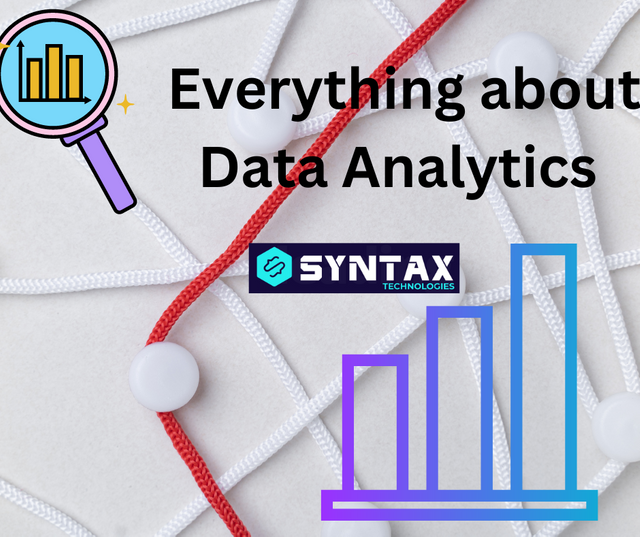Everything about Data Analytics
Data has become a crucial asset for businesses in today's digital age. With the vast amount of data being generated, organizations are able to gain valuable insights that can be used to improve decision-making, increase efficiency, and drive growth. This is why many companies are investing in data analytics and hiring data professionals to help them extract insights from data.

What is Data Analytics?
Data analytics is the process of examining, cleaning, transforming, and modeling data with the goal of discovering useful information, informing conclusions, and supporting decision-making. It involves using various techniques and tools to extract insights from data, such as statistical analysis, machine learning, and data visualization. Data analytics can be applied to various fields, such as finance, healthcare, marketing, and manufacturing, and is used to improve decision-making, increase efficiency, and gain a competitive advantage.
How to learn Data Analytics?
There are several ways to learn data analytics, including:
Online Data Analytics Courses:
There are many online platforms such as Syntax Technologies that offer online data analytics courses at different levels, from beginner to advanced. These courses are self-paced and cover a wide range of topics, including statistics, machine learning, and data visualization.
Data Analyst Bootcamps:
Data analytics bootcamps are intensive, in-person or online programs that provide a comprehensive and hands-on learning experience. They are designed to teach students the skills they need to become a data analyst in a short period of time.
University Programs:
Many universities offer undergraduate and graduate programs in data science, statistics, or computer science that cover data analytics. These programs provide a more in-depth and formal education and often include opportunities for research, internships, and data analytics training.
Data Analytics Books:
There are many books available on data analytics that can be used as a reference or a self-study guide. Some popular books include "Python for Data Analysis" by Wes McKinney, "Data Science from Scratch" by Joel Grus, and "R for Data Science" by Hadley Wickham.
Practical Experience:
Practical experience is the key to learn data analytics. By working on real-world projects, you will gain hands-on experience in data cleaning, analysis, and visualization.
Data Analytics Certifications:
Data analytics certifications can demonstrate your knowledge and expertise in data analytics to potential employers. Some popular certifications include Certified Analytics Professional (CAP), SAS Certified Data Scientist, and Microsoft Certified: Azure Data Scientist Associate.
What Does a Data Analyst Do?
A data analyst is a professional who is responsible for collecting, cleaning, analyzing, and interpreting large sets of data to inform business decisions and optimize processes. The specific tasks of a data analyst may vary depending on the organization and industry, but common responsibilities include:
• Collecting and organizing data from various sources, such as databases, surveys, and social media
• Cleaning and prepping data to ensure its accuracy and completeness
• Using statistical techniques and tools to analyze data and identify patterns and trends
• Interpreting data and communicating findings to stakeholders through data visualizations, reports, and presentations
• Creating predictive models and identifying opportunities for process improvements
• Collaborating with cross-functional teams to ensure data is being used to support decision-making and drive business growth
• Staying up-to-date with industry trends and new technologies to improve data analysis techniques.
A data analyst may also be responsible for ensuring data privacy and security, and addressing any ethical considerations. A data analyst should have strong analytical, problem-solving and technical skills, as well as excellent communication and presentation skills to effectively convey the insights derived from the data.
Data Analyst Skills
Data analysts typically have a strong combination of technical and analytical skills, as well as business acumen and communication skills. Some of the key skills required for a data analyst include:
• Technical Skills
• Analytical Skills
• Business Acumen
• Communication Skills
• Problem-Solving
• Attention to Detail
• Time Management
• Continual Learning
Some of the soft skills that a data analyst should possess are:
• Strong communication and collaboration skills.
• Ability to work well under pressure and manage multiple tasks simultaneously.
• Strong critical thinking and problem-solving abilities.
• Creativity and ability to think outside the box.
• Ability to work independently and as part of a team.
Having a degree in fields like mathematics, statistics, economics, computer science or related fields is preferred, but not always required. Certifications in data analytics, such as a Certified Analytics Professional (CAP), can also be beneficial.
Data Analyst Entry Level Jobs
An entry-level data analyst is a professional who is just starting their career in the field of data analytics. These jobs typically require some level of experience or education in data analysis or a related field, but not necessarily as much as more senior roles. Some common entry-level data analyst jobs include:
• Junior Data Analyst
• Data Analyst Intern
• Business Intelligence Analyst
• Operations Analyst
• Data Entry Analyst
To land an entry-level data analyst job, it's important to have a solid foundation in data analysis, as well as relevant experience or education in a related field. Strong analytical, problem-solving and technical skills, as well as excellent communication and presentation skills, are also important. Additionally, certifications in data analytics can be beneficial, and having a portfolio of projects showcasing relevant skills is a plus.
Conclusion
In conclusion, Data analytics is an important field which helps to extract insights from data to drive business decisions, improve operations and drive growth. It involves various types of analytics, and can be applied to various fields. There are various tools and technologies available for data analytics, and it has become increasingly important in today's digital age. However, there are also challenges associated with data analytics, such as data privacy and security, data bias and ethical considerations, and the need for specialized skills and knowledge.
Syntax Technologies' Career Courses in Data Analytics are the perfect choice for those looking to build their career in the field and seeking enrollment in Online Data Analytics Course.